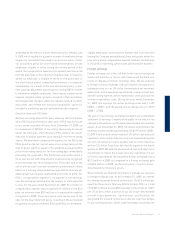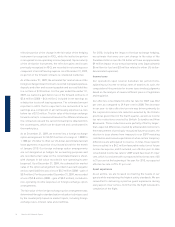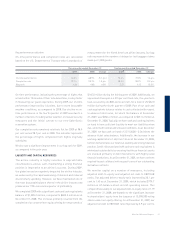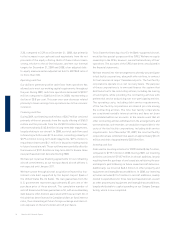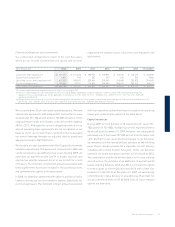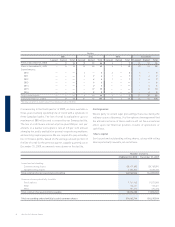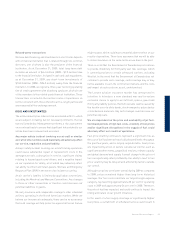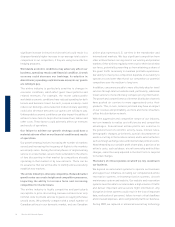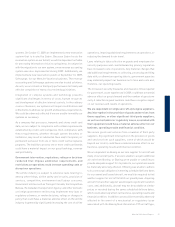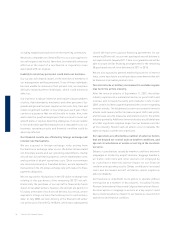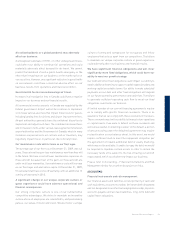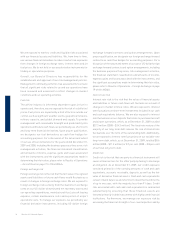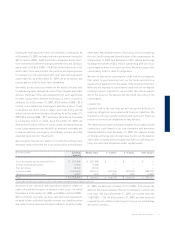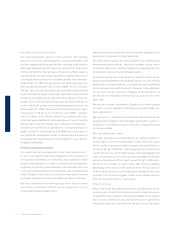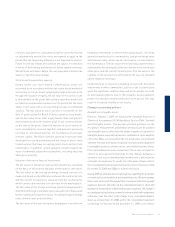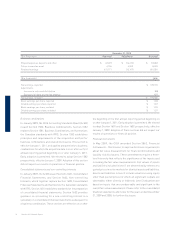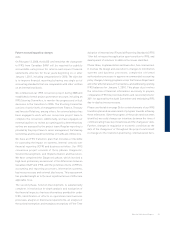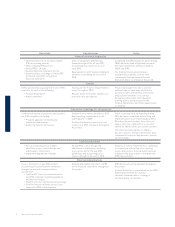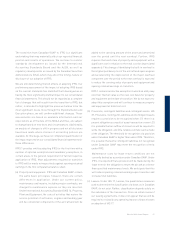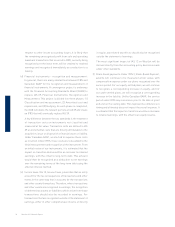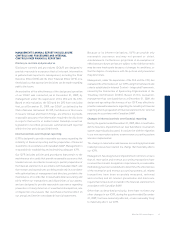Westjet 2009 Annual Report Download - page 59
Download and view the complete annual report
Please find page 59 of the 2009 Westjet annual report below. You can navigate through the pages in the report by either clicking on the pages listed below, or by using the keyword search tool below to find specific information within the annual report.
WestJet 2009 Annual Report 29
culture of caring and compassion for our guests and fellow
employees that sets us apart from our competitors. The failure
to maintain our unique corporate culture or guest experience
could adversely affect our business and fi nancial results.
We have significant financial obligations and will incur
signifi cantly more fi xed obligations, which could harm our
ability to meet our growth strategy.
Our debt and other fi xed obligations could impact our ability to
obtain additional fi nancing to support capital expansion plans and
working capital on suitable terms. Our ability to make scheduled
payments on our debt and other fi xed obligations will depend
on our future operating performance and cash fl ow. The failure
to generate suffi cient operating cash fl ow to meet our fi xed
obligations could harm our business.
A limited number of our current fi nancing agreements require
us to comply with specific financial covenants. There is no
assurance that we can comply with these covenants in the future.
These covenants may limit our ability to fi nance future operations
or capital needs. If we were to default on these covenants and
were unsuccessful in obtaining a waiver of the default, a portion
of amounts owing under the defaulted agreement may require
reclassifi cation on our balance sheet. In this event, we would
require suffi cient cash to meet the repayment obligation per
the agreement or require additional debt or equity fi nancing,
which may not be available. If unable to repay the debt, we would
be required to liquidate certain assets in order to obtain the
necessary funds or be subject to the risk of having our aircraft
repossessed, which could adversely impact our business.
Please refer to Accounting – Financial Instruments and Risk
Management below for a further discussion on risks.
ACCOUNTING
Financial instruments and risk management
Our fi nancial assets and liabilities consist primarily of cash and
cash equivalents, accounts receivable, derivatives both designated
and not designated in an effective hedging relationship, deposits,
accounts payable and accrued liabilities, long-term debt and
capital lease obligations.
A localized epidemic or a global pandemic may adversely
affect our business.
A widespread outbreak of H1N1, or other widespread illness,
could affect our ability to continue full operations and could
materially adversely affect demand for air travel. We cannot
predict the likelihood of such a public health emergency or the
effect that it may have on our business or the market price of
our securities. However, any signifi cant reduction in guest traffi c
on our network could have a material adverse effect on our
business, results from operations and fi nancial condition.
Governmental fee increases discourage air travel.
Increases in air navigation fees in Canada could have a negative
impact on our business and our fi nancial results.
All commercial service airports in Canada are regulated by the
federal government. Airport authorities continue to implement
or increase various user fees that impact travel costs for guests,
including landing fees for airlines and airport improvement fees.
Airport authorities generally have the unilateral discretion to
implement and adjust such fees. The combined increased fees,
and increases in rents under various lease agreements between
airport authorities and the Government of Canada, which in many
instances are passed on to air carriers and air travellers, may
negatively impact travel, in particular, discretionary travel.
Our maintenance costs will increase as our fl eet ages.
The average age of our fl eet as at December 31, 2009, was 4.4
years. These aircraft require less maintenance now than they will
in the future. We have incurred lower maintenance expenses on
these aircraft because most of the parts on these aircraft are
under multi year warranties. Our maintenance costs will increase
as our fl eet ages and warranties expire. At December 31, 2009,
51 owned aircraft have come off warranty, with an additional 12
coming off warranty in 2010.
A significant change in our unique corporate culture or
guest experience could have adverse operational and
fi nancial consequences.
Our strong corporate culture is one of our fundamental
competitive advantages. We strive to maintain an innovative
culture where all employees are committed to, and passionately
pursue, our values, mission and vision. We also foster a unique


